#galton and simpson
Explore tagged Tumblr posts
Text

Radio Times, 19 -25 February 1972 with Steptoe and Son, the most famous residents of Oil Drum Lane, getting the cover honours. Wilfrid Brambell (1912-1985) played Albert Steptoe and Harry H. Corbett (1925-1982) his son Harold Steptoe. Written by Ray Galton and Alan Simpson it originally ran from 1962 to 1965 and then returned to the screens in 1970. It did make me laugh but equally I always found it uncomfortable viewing with Harold kept too much of a prisoner by his father.
7 notes
·
View notes
Text
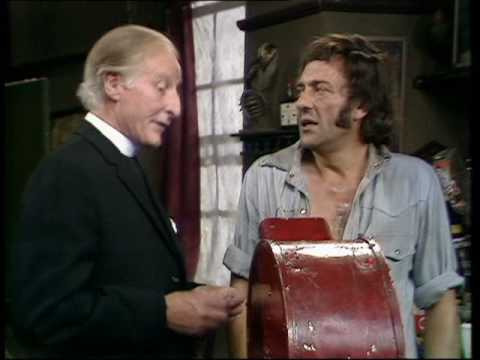


Porn Yesterday was a 1974 episode of Steptoe and Son, from the final series. Harold (Harry H Corbett) picks up an antique ‘What the Butler Saw’ machine on his rounds and brings it home to Oil Drum Lane. He is delightedly running the images of vintage pornography through the viewfinder, until he recognises his father featuring in a scene that also involved a woman and bath full of milk. Suddenly it’s not quite as much fun, and Harold is worried that any scandal might affect his already faltering chances of getting into the golf club.
"What my poor mother must have gone through. She didn’t know about this, did she?"
“Course she did, that was her sister in the bath.”
“Auntie Rose???”
“They were desperate times. Everything we had was in pawn.”
“So were you!”
Although being played largely for broad comedy with some great one-liners, the writers, Ray Galton and Alan Simpson, could still bring out some intense dramatic performances with rapid changes in mood, a technique later used to great effect by John Sullivan in Only Fools and Horses.
Addressing Harold’s disgust, Albert Steptoe (Wilfrid Brambell) recalls the economic conditions of the time, the poverty and starvation, and how desperate young people were being exploited and misled with the offer of a fiver for being in what they believed would be legitimate films to be shown at the Gaumont. At times, the studio audience seems at a loss as to how to react. When Albert is reduced to tears, there is a brief laugh. The audience also laughs when Albert relates that poor Auntie Rose had died of pneumonia two weeks after being immersed in the milk bath.
There’s a happy ending; a deal is done with the local Vicar to make the machine available for the church jumble sale and split the profits. Albert becomes a celebrity in the parish, signing autographs for which the Vicar cheerfully charges two shillings each for church funds.
Steptoe and Son came about as a result of Galton and Simpson being offered a series of ten 30 minute slots for the BBC’s anthology, Comedy Playhouse, with total creative freedom. One episode, The Offer (1962), featured father and son rag and bone men, and was innovative in that actors, rather than variety comics, were cast in the principal roles. Harry H Corbett, at that point seen as a serious dramatic actor with enormous promise, surprised and delighted Galton and Simpson with his interpretation of his role, especially crying real, hopeless tears at the end.
Steptoe and Son ran from 1962-65 and then again 1970-74; a total of 57 episodes. During the early run of the series, Harry H Corbett and Wilfrid Brambell were such big stars they co-headlined the 1963 Royal Variety Performance with the Beatles.
One of the interesting things to note about the series is the intensity of the acting through long, dialogue-heavy scenes, and with very few detectable mistakes. Retakes were frowned upon in those days due to the expense, and so as not to ruin spontaneity with the studio audience. It’s interesting to compare with Dad’s Army, for example, which retains obvious dialogue stumbles, continuity mistakes and goofs right the way through.
It’s also interesting to imagine Steptoe and Son without the audience laughter. (We get some idea from the feature films). Albert takes vindictive delight in derailing any attempts by Harold to live a life of his own, while Albert is, at times, cowering in fear in the face of Harold’s potentially violent temper. The comedic aspects aside, it would actually make a dark, confronting and occasionally frightening kitchen sink family drama.
It was reported that, at the 1964 general election, Labour Leader Harold Wilson attempted to have the Thursday evening screening of Steptoe rescheduled, concerned that potential Labour voters would be staying home to watch it, rather than coming out to vote. The BBC did not change their programming, and Labour won with a four seat majority.
#steptoe and son#social history#bbc comedy#galton and simpson#working class history#british culture#wilfrid brambell#harry h corbett#harold wilson#uk politics
29 notes
·
View notes
Text




#me when i'm not entirely sure whether i like the book i'm reading...lol#paul merton#paul merton in galton & simpson's...#my gifs
5 notes
·
View notes
Text
Harry Enfield and Paul Whitehouse star in new Radio 4 drama, “When Alan Met Ray”
Harry Enfield and Paul Whitehouse are to portray comedy writers Ray Galton and Alan Simpson in a new radio play, When Alan Met Ray, broadcasting on Radio Four this week
Harry Enfield and Paul Whitehouse are to portray comedy writers Ray Galton and Alan Simpson in a new radio play, When Alan Met Ray, broadcasting on Radio Four this week, which is set in Milford Tuberculosis Sanatorium, Surrey where they first met in 1948. Image: BBC Galton and Simpson were a British comedy scriptwriting duo, who wrote for radio, television and film, consisting of Ray…
2 notes
·
View notes
Text
Match Review: Manchester United Women 5-3 Newcastle United Women
Well it wasn't difficult, but we didn't make it easy either...

Before we begin - a first start for backup keeper and Wales international Safia Middleton-Patel, who I'm a big fan of. Phallon is clear of her in terms of goalkeeping ability (at present - and she is older) but Saf being autistic presents a different challenge for herself and United's coaching staff in terms of training, development and more, so it's fantastic to see her going from strength to strength.
The game itself was a corker for the neutrals, but that I am not so lets break it down:
A pinpoint corner from Anna Sandberg on the right side forced a mistake and an own goal from Lia Cataldo in the 9th minute to make it 1-0 United.
Newcastle countered four minutes later through Deanna Cooper; a good finish to beat SMP in net but dogshit defending from United. Simi Awujo just hovering behind her shoulder, Hayley Ladd trotting alongside, Millie Turner hesitant to get stuck in, Dominique Janssen the wrong side of her attacker... Saf could perhaps have done more with the save but you expect more protection when you have a fresh face in net - especially a youngster. 1-1.
Luckily, Emma Watson had a baller game. She came close with a chance soon after this and finally bagged her first United goal in the 24th minute - an cool side-foot finish past the outrushing Newcastle keeper Claudia Moan after some unchallenged dribbling from captain Maya Le Tissier, who worked her way across into in the D of the Newcastle box.
In the second half, Newcastle would strike back to even the tie almost immediately; Amy Andrews scoring a tidy shot that again, Middleton-Patel got close to. I do believe Phallon or Earps save that, but Gabby George deputising at CB made a huge error, and Millie Turner did nothing to help bail her out. 2-2.
20 minutes later and Grace Clinton would produce a bit of magic with a tough acute shot that rebounded to Rach Williams for a tap in. 3-2 United, lead restored.
In the 83rd minute we got another first goal for United, this time from Gabby George who to be fair improved steadily as the game went on at CB. A beautiful floated free kick from Anna Sandberg was met by the stooping head of George to put United clear at 4-2.
2 minutes from time and again Grace Clinton came into action, releasing Leah Galton down the left for a FIFA-style square pass into the box and an easy (albeit almost fluffed lmao) tap-in for substitute Elisabeth Terland. 5-2 United, points secured, surely?
There would be one more flashpoint in the game, in the third minute of stoppage time, with poor headers from George and Ladd allowing Lois Joel to hit one from 25 yards out with a weird bobble mid-way that threw Middleton-Patel's dive prediction off and gave Newcastle a little more of a consolation at a 5-3 defeat.

Rotation is important, and this was a good performance from a rotated side. Were it not rotated... I'd have quibbles. I expect a little more from the keeper, I definitely expect more confident defending from the back 4 and my DMs. Things to be worked on, but nothing scary or disastrous, so we move.
I personally would like to have seen Lucy Newell feature, so maybe start Gabby over Dom and then bring Lucy in, but I was happy for Safia, Emma Watson's full 90, the first United goals for Emma and Gabby, and a full 90 in the tank for Anna Sandberg whose set pieces... oof, big dog. Here's hoping Lucy can make a debut against her former side West Brom in January at least...
This was the last game at LSV for 2024, and next up is Crystal Palace away on Sunday at 2pm.
As mentioned, we return in the New Year for a home game in the FA Cup 4th Round against West Bromwich Albion - a team I have a degree of connection with, photographing them most weeks. Being honest, United should absolutely maul them, but as it's an away game for them I have no chance of bagging my usual photo pass. Here's hoping my United connections can work some magic, but otherwise I'll be cheering United on from the stands!

As always, United's YouTube account hates embeds and links to watch videos in their player, so WSL Channel it is. Grow up, United.
youtube
#manchester united#man u#man united#man utd#manchester reds#manchester united women#newcastle united women#gabby george#marc skinner#safia middleton-patel#leah galton#grace clinton#rachel williams#elisabeth terland#emma watson#leigh sports village#league cup#lsv#anna sandberg#evie rabjohn#jess simpson#Youtube
4 notes
·
View notes
Text
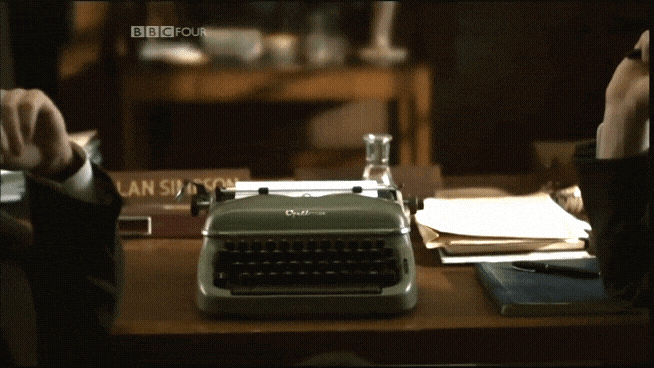
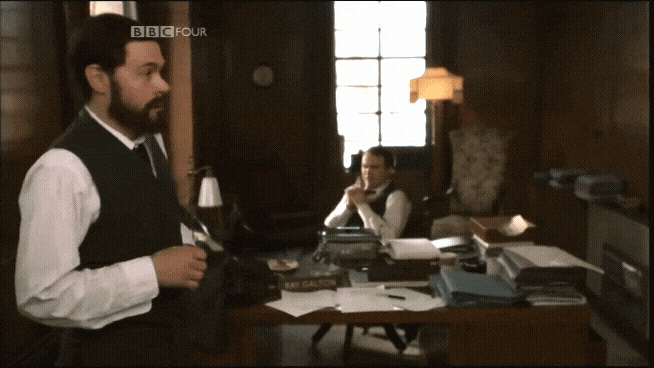
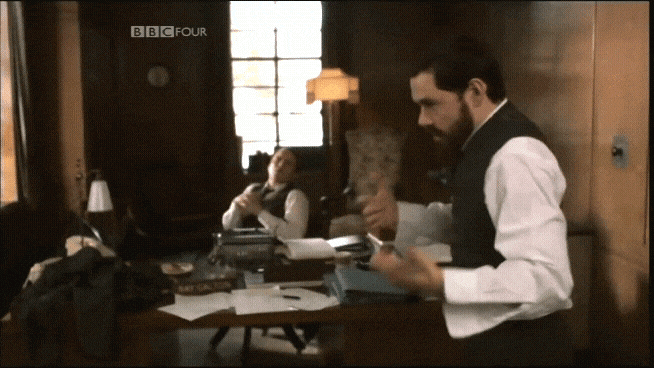

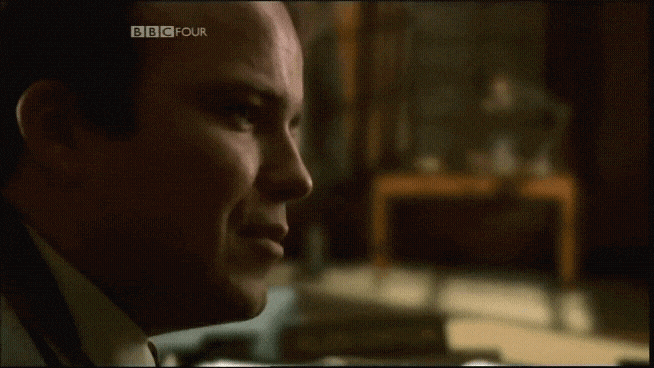

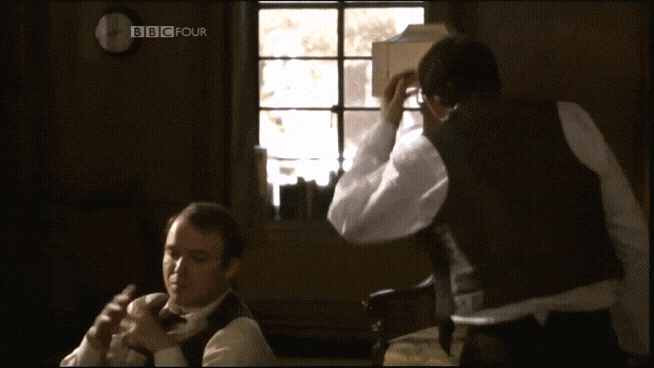


"I saw a rag-and-bone man in the street, on the way over."
"A rag-and-bone man? What an awful premise for a sitcom that would be."
Burn Gorman & Rory Kinnear as Ray Galton & Alan Simpson in The Curse of Steptoe
#burn gorman#rory kinnear#ray galton#alan simpson#the curse of steptoe#my gifs#i actually really loved this movie; i watched it twice already this weekend#like most biopics though this one kind of left a lead like weight in my chest#in the good way#if not for burn i would have eventually watched this for jason isaacs#also phil davis?????#in otger news the beard has grown on me and seeing burn clean shaven again may cause me whiplash#shut up ace#man i need a tag for burn now fuck#period film#1960s#steptoe and son#bbc 4
13 notes
·
View notes
Text




29th August 1999 saw the death of Lew Schwarz, the Scottish TV scriptwriter.
Lew was born in Glasgow on April 16th, 1926, the son of an optician, and educated at the St Aloysius Jesuit College, graduating to the Holyrood Secondary Modern School.
On leaving school he took a job at the Clyde shipyards as a riveter. In 1944 he joined the RAF as a flight engineer and flew Lancaster bombers over Germany. After the war he returned to Scotland, furthering his education at Glasgow University before moving to London in the 1950s. There he took on a job as a taxi driver, married Margaret Glen of Airdrie, and in due time fathered three sons and two daughters.
It was while driving his taxi that Schwarz sold his first few comedy gags. Always a fan of radio-show comedy, he sent his samples to Richard Murdoch, then starring with Kenneth Horne in Much Binding In The Marsh, The Forces Show, and other prominent BBC series. Murdoch bought them, thus starting Schwarz on a career which would soon spread from spare time to full time.
It was through his taxi-driving that Schwarz encountered Spike Milligan, writer and star of The Goon Show. They got to chatting about comedy and Milligan invited Schwarz to come up to the office he and some writer friends used as a base. This was situated over a greengrocer's shop in Shepherd's Bush, not far from the BBC Television studios. Schwarz was delighted to meet Milligan's partners in laughter: Eric Sykes, Johnny Speight, Ray Galton, and Alan Simpson, all great names in comedy creation
Joining the group as a gag writer, Schwarz was taken on as a partner by another big name in comedy, Eric Merriman. Together they wrote their first TV series, Great Scott - It's Maynard! This starred two popular stand-up comedians, Terry Scott, who frequently played an overgrown schoolboy, and Bill Maynard, not yet the chunky character he would become. The show mixed short sketches with situation comedy, aThe Charlie Drake Shownd was a great success. In the 50′s he also wrote episodes of
Lew went on to write a host of other shows, The Army Game, Mess Mates and The Dick Emery Show in the 60′s as well as scripting 3 episodes of The Andy Stewart Show.
In the 70′s he wrote scripts for Harry Secombe, Dave Allen and Norman Wisdom, as well as writing for Carry on Laughing and the popular sitcom The Liver Birds, which Schwarz originated with Carla Lane. Schwartz also penned some mainstream drama like Crown Court, Crossroads and an episode of Space;1999.
Closing his comedy career teaching creative writing at an adult educational college, Schwarz wrote a book, The Craft of Writing TV comedy. He summed up his career thus: ''Writing comedy for television is a very serious business.''
8 notes
·
View notes
Text
Comedy Playhouse: Elementary, My Dear Watson
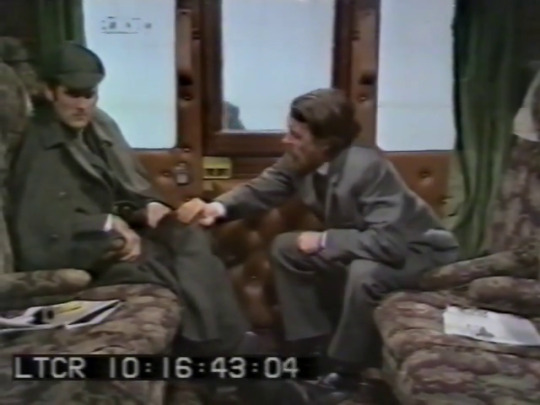
I'm not sure how this blog post is going to turn out and think it might be rather different to my usual style because the TV programme I'm writing about is radically different from most of the TV shows I have ever watched.
Don't be taken in by the fact this play was broadcast in 1973 under the Comedy Playhouse title. This show is of course a national institution, initially being started in 1961 largely as a vehicle for Galton and Simpson before ending 128 episodes later in 1975. It's unusual for a show of the time because you can see many of its episodes: there are some on the internet but they're also found scattered across the boxed sets of the shows it spawned as independent productions: Steptoe and Son, Meet the Wife, Till Death us do Part, All Gas aqnd Gaiters, Up Pompeii, Not in Front of the Children, The Liver Birds, Are You Being Served and Last of the Summer Wine. This show has spun off an incredible amount of television for one series.
Clearly we're in legendary TV territory already but what elevates Elementary, My Dear Watson above the already great stable it came from was that it was written by NF Simpson. He was a playwright who identified with the Theatre of the Absurd, which built on Albert Camus's idea that human existence is essentially abusrd, and devoid of purpose (britannica.com). The way this came out in their theatre was that they tended to get rid of plot, they abandoned the traditional structures of theatre. You will readily see that once again I am punching well above my weight, writing about this show. There isn't much of Simpson's work available to be seen because he was writing right in the middle of key TV junking time, although apparently he wrote the scripts for two episodes of The Dick Emery Show, which may or may not available. Possibly the other most available of his work is One Way Pendulum (1964) in which amongst other things, one character builds a reproduction of the Old Bailey in his front room and Jonathan Miller conducts a choir of Speak Your Weight Machines. You can tell that Elementary My Dear Watson is incredibly highbrow because of its being prominently featured by the British Film Institute.
The way Simpson's approach comes out in Elementary My Dear Watson is that you will be hard pressed to follow the plot, if indeed there is one. His style requires around short scenes, and non-sequiturs: if you haven't seen any of his work I think you would probably like this if you like Monty Python. It's a show which requires careful attention, because you easily miss some small twist and find yourself wondering what is going on. There are two main plots going on at once. There is a further theme where Jack the Ripper keeps ringing up Scotland Yard to confess but they've never heard of him. Fu Man Chu wants the main exhibit, a dead solicitor. In the middle another dead solicitor appears as the object in a spoof object of Call My Bluff. There is a further theme involving a piano tuner in drag, which is stated to be used because otherwise the show wouldn't fill the time. To cut a long story short: the ingredients of a Sherlock Holmes adventure and other Victorian adventures are mixed up a bit, moved to 1973, and given a coat of surrealism.
As you can tell, I love this show, could watch it over and over and think it's absolutely marvellous. There is another aspect which is wonderful, though, and that was casting John Cleese as Sherlock Holmes. Basil Rathbone and Benedict Crumblysnatch can just give up now because I have to say that Cleese is the Holmes we have been waiting for. Imagine the energy of Basil Fawlty applied to Sherlock Holmes, perfectly foiled by Willy Rushton as Watson, and you have the idea. There's another opportunity to watch Cleese as Holmes (or rather a descendant) in the similarly absurd The Strange Case of the End of Civilisation as We Know It (1979), which I think is also best understood as a series of sketches.
I'm not going to beat about the bush, reading the commentary online it is apparent that a small amount of Simpson's work goes a long way for a lot of people. If you want me to criticise this show I would have to say that the main problem as far as I can see is to wonder what this masterpiece of absurd theatre is doing in a comedy slot, because it's way above being a simple comedy.
I think, though, that if you watch it as what it is and don't expect a simple comedy, it had layers of absurdity which are incredibly enjoyable.
This blog is mirrored at
culttvblog.tumblr.com/archive (from September 2023) and culttvblog.substack.com (from January 2023 and where you can subscribe by email)
Archives from 2013 to September 2023 may be found at culttvblog.blogspot.com and there is an index to the tags used on the Tumblr version at https://www.tumblr.com/culttvblog/729194158177370112/this-blog
2 notes
·
View notes
Text
if this episode with Secombe is anything to go by, the problem is less Hancock and more that Galton and Simpson would have killed anybody doing the Half Hour. wot bastards.
2 notes
·
View notes
Text

TV listing for Paul Merton in Galton and Simpson's…The Suit from Radio Times issue 4-10 October 1997
Credit: @/AdamNostalgia on twitter
5 notes
·
View notes
Text

Harry H Corbett, Diana Dors, and Wilfrid Brambell in the second feature film adaptation of Steptoe and Son; Steptoe and Son Ride Again, released in July 1973.
It was directed by Australian-born Peter Sykes (1939-2006) whose other comedy for Nat Cohen-EMI was Frankie Howerd's House in Nightmare Park.
The second Steptoe feature copped a bit of a pasting from the critics, the principal objections being that some of the subtleties of the father-son relationship were lost and the humour was unnecessarily cruder.
It also didn't live up to the box-office success of its predecessor; writers Ray Galton and Alan Simpson speculated that the title was ambiguous and potentially confusing, and may have given the impression to audiences that it was a rerelease of the first Steptoe and Son feature from the previous year.
In 1973, Britain's film industry was described as 'in crisis, due to a combination of declining audiences, a weak dollar and lack of overseas investment. Anglo-EMI was the biggest studio operating in the country and was dubbed 'Britain's one man film industry'.'
#social history#working class history#british cinema#steptoe and son#harry h corbett#diana dors#wilfrid brambell#british culture#british comedy
29 notes
·
View notes
Text


#excuse the pun but...smoking hot!#lol sorry...but dang that wistful look in gif two i'm certainly very weak for that#paul merton#paul merton in galton & simpson's...#my gifs
7 notes
·
View notes
Text
Apollo Theatre Company takes Galton & Simpson’s "Hancock’s Half Hour: The Lost Episodes" on Tour
The Apollo Theatre Company will tour a show based on a radio comedy classic, Hancock's Half Hour, around the UK this autumn
The Apollo Theatre Company, producers of the critically acclaimed tours of Round the Horne and The Goon Show will tour another show based on a radio comedy classic, Hancock’s Half Hour, around the UK this autumn. Back in 1954, Tony Hancock – the focus of the unconnected but relevant Tripwire award-nominated graphic novel, Hancock – The Lad Himself – burst onto the airwaves of the BBC Light…
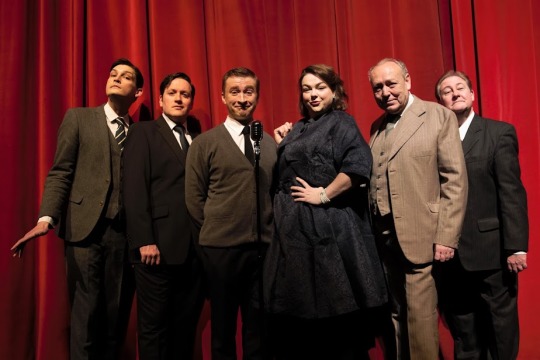
View On WordPress
2 notes
·
View notes
Photo




Foil channelling Albert Steptoe 😂
[x]
Support Foil Arms and Hog on Patreon
#steptoe and son#LOOK IT UP#one of the best comedies ever#galton and simpson#albert steptoe#lmao#foil#foil arms and hog#there's something about patrick#neil delamere#st patrick#ireland#irish#comedy#irish comedy#gifs#my gifs
16 notes
·
View notes
Text
29th August 1999 saw the death of Lew Schwarz, the Scottish TV scriptwriter.
Lew was born in Glasgow on April 16th, 1926, the son of an optician, and educated at the St Aloysius Jesuit College, graduating to the Holyrood Secondary Modern School.
On leaving school he took a job at the Clyde shipyards as a riveter. In 1944 he joined the RAF as a flight engineer and flew Lancaster bombers over Germany. After the war he returned to Scotland, furthering his education at Glasgow University before moving to London in the 1950s. There he took on a job as a taxi driver, married Margaret Glen of Airdrie, and in due time fathered three sons and two daughters.
It was while driving his taxi that Schwarz sold his first few comedy gags. Always a fan of radio-show comedy, he sent his samples to Richard Murdoch, then starring with Kenneth Horne in Much Binding In The Marsh, The Forces Show, and other prominent BBC series. Murdoch bought them, thus starting Schwarz on a career which would soon spread from spare time to full time.
It was through his taxi-driving that Schwarz encountered Spike Milligan, writer and star of The Goon Show. They got to chatting about comedy and Milligan invited Schwarz to come up to the office he and some writer friends used as a base. This was situated over a greengrocer's shop in Shepherd's Bush, not far from the BBC Television studios. Schwarz was delighted to meet Milligan's partners in laughter: Eric Sykes, Johnny Speight, Ray Galton, and Alan Simpson, all great names in comedy creation
Joining the group as a gag writer, Schwarz was taken on as a partner by another big name in comedy, Eric Merriman. Together they wrote their first TV series, Great Scott - It's Maynard! This starred two popular stand-up comedians, Terry Scott, who frequently played an overgrown schoolboy, and Bill Maynard, not yet the chunky character he would become. The show mixed short sketches with situation comedy, aThe Charlie Drake Shownd was a great success. In the 50′s he also wrote episodes of
Lew went on to write a host of other shows, The Army Game, Mess Mates and The Dick Emery Show in the 60′s as well as scripting 3 episodes of The Andy Stewart Show.
In the 70′s he wrote scripts for Harry Secombe, Dave Allen and Norman Wisdom, as well as writing for Carry on Laughing and the popular sitcom The Liver Birds, which Schwarz originated with Carla Lane. Schwartz also penned some mainstream drama like Crown Court, Crossroads and an episode of Space;1999.
Closing his comedy career teaching creative writing at an adult educational college, Schwarz wrote a book, The Craft of Writing TV comedy. He summed up his career thus: ''Writing comedy for television is a very serious business.''
9 notes
·
View notes
Video
youtube
Hancock's Half Hour
1 note
·
View note